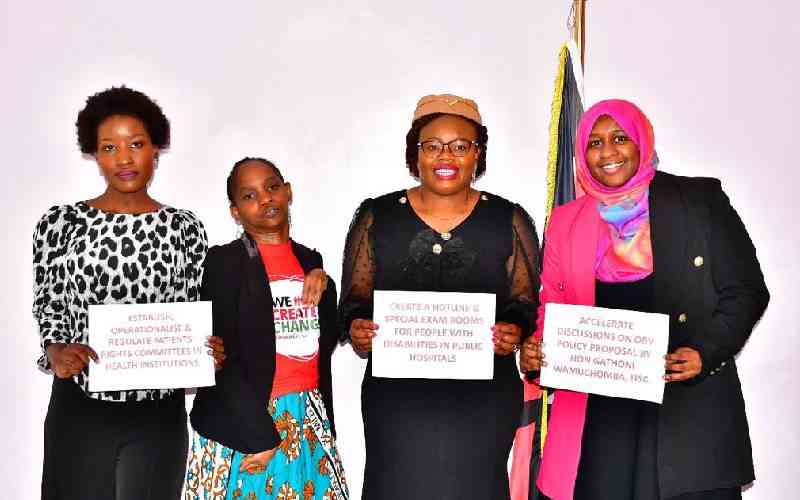
A group of activists has thrown their weight behind Githunguri MP Gathoni Wamuchomba's campaign aimed at eradicating obstetric violence against women across the country.
Under the umbrella of Nguvu Change Leaders and GAMAFRICA Foundation, the activists have called for a national policy on obstetric violence.
They made the calls in line with International Day for the Elimination of Violence against Women which is observed on November 25.
Harriet Afandi, Josephine Mwende, and Deborah Monari, three young women who have been championing respectful healthcare for women in Kenya said Wamuchomba's 'Heshimu Uzazi' campaign will play a vital role in ensuring pregnant women are safeguarded from neglect and negligence.
Last month Wamuchomba said she would table in Parliament a bill seeking to provide the legal, administrative and economic frameworks against OBV in Kenya.
- Over 100 people die by suicide in three months in Nyeri County
- Kenya steps up health investments to safeguard mothers and children
- Kenya elevates care work as a public good, pledges bold action to empower caregivers
- Digital spaces fuel rise in online sexual abuse of women amid weak safeguards
Keep Reading
"Every woman, regardless of her social or economic status deserves a dignified and respectful childbirth experience, free from any form of violence or abuse. The time has come for us to undo the injustices suffered by women under OBV in Kenya," Wamuchomba said.
The lawmaker herself is no stranger to OBV after disclosing how she gave birth to her firstborn baby inside the toilet of a high-end private hospital in Nairobi in 2003.
"I was put in a private room when I reported to the hospital. I was injected with medicine to induce labour on three different occasions," she narrated to The Standard during an interview.
In a statement to newsrooms, Wamuchomba said across delivery rooms and maternity wards in Kenya, many women remain similarly unassisted and neglected as they struggle through childbirth.
This she said is even worse if it involves women with disability.
Types of OBV include wrong treatment, denial of care, forced procedures, Physical abuse, detention in facilities, discrimination, verbal abuse, newborns and infant theft and exchange.
"This is gender-based violence and needs to stop immediately! The stories of Harriet, Josephine, and Deborah, and scores of other women being mistreated in hospitals resonate with me and are indicative of the urgent need for legislation against the neglect and abuse that women are subjected to," the legislator said.
Harriet Afandi, a Nguvu Change Leader from Vihiga County said her sister almost died during birth as a result of such neglect.
She said her sister was forced to go under an emergency C-Section surgery 11 days after her due date because her clinical nurses told her that it was not the 'right time' yet.
Her sentiments are echoed by Josephine Mwende whose petition is rooted in lived experience as she sheds light on the appalling discrimination she faced as an expecting mother with cerebral palsy.
"I was rejected by one hospital after another because of my condition. It was heartbreaking when a doctor told my mother, 'We don't handle such people!'.
Mwende said luckily for her, she finally delivered her baby at Kenyatta National Hospital.
"Despite the misconception that women with cerebral palsy cannot or should not bear children, I not only gave birth to my son but also named him, 'Gift.' I hope no woman with cerebral palsy ever faces the pain, rejection, and humiliation that I went through," read part of the statement.
Deborah Monari is a dedicated nurse who faced medical malpractice and violation of her patient rights within the very system that she trusted.
Her petition is seeking that a Patient Rights Committee be established in all health institutions to handle symptomatic of the apathy in a failing healthcare system that has subjected many women to OBV.
'Heshimu Uzazi' campaign, spearheaded by the Gathoni Muchomba Africa Foundation (GAMAFRICA), amplifies the call for action against OBV.
The movement, supported by the Kenya Women Parliamentary Association (KEWOPA), embodies an unflinching resolve to eradicate obstetric violence and ensure safe, dignified childbirth for all women in Kenya.
 The Standard Group Plc is a multi-media organization with investments in media
platforms spanning newspaper print
operations, television, radio broadcasting, digital and online services. The
Standard Group is recognized as a
leading multi-media house in Kenya with a key influence in matters of national
and international interest.
The Standard Group Plc is a multi-media organization with investments in media
platforms spanning newspaper print
operations, television, radio broadcasting, digital and online services. The
Standard Group is recognized as a
leading multi-media house in Kenya with a key influence in matters of national
and international interest.











